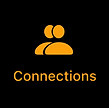Immersion
Redefining Digital Wellness through System-Level Design
While most wellness apps compete for your attention, Immersion works behind the scenes. It is a speculative iOS extension that uses contextual soundscapes and adaptive UI to reduce cognitive load, fostering deep focus and emotional balance without the friction of a traditional app.

The Problem
Most wellness apps (like Calm or Forest) actually add to our screen time because you have to open them to use them. This creates "friction", the more steps it takes to focus, the less likely we are to do it. Our phones are currently designed to keep us scrolling, making it hard to switch into work mode.
The Solution
Immersion isn’t an app; it’s a built-in feature for your phone’s operating system (iOS). By integrating tools like soundscapes and "grayscale" mode directly into the system, it removes the extra steps. It turns the phone from a source of distraction into a tool that helps you stay calm and productive.
Feature 01
Immersive Focus Mode
A system-wide shift that pairs personalized soundscapes with a grayscale UI. This "visual silence" reduces dopamine triggers and encourages long-term concentration.

Feature 02
Social Accountability Group Focus
Leverages AirDrop and system connectivity to create shared focus sessions. This fosters "social presence," helping teams or families stay offline together.

Feature 03
Performance Analytics
Bridging wellness and productivity by providing data insights that connect "Immersion time" to actual output and cognitive performance.


Strategic Research & Insights
Competitive Strategy (SWOT Analysis)
I analyzed industry leaders like Calm and Endel to identify market gaps:


-
The Problem: Existing tools are often expensive ($60+/year) and act as "silos" that lack deep system integration.
-
The Opportunity: By simplifying the user flow and integrating with the iOS Control Center, Immersion captures the user at the moment of distraction rather than waiting for them to open an app.
User Behavior Insights
Primary research revealed three critical pain points:
-
Unconscious Loops: Users pick up phones out of habit, not necessity.
-
Sensory Hunger: The brain craves the visual/auditory stimulation of the phone.
-
The Effort Barrier: Users find it "too hard" to find a quiet space or a focus app when they are already stressed.
Design Process
-
Discover: Conducted ethnographic interviews to map out the "trigger-action-reward" cycle of phone addiction.
-
Define: Targeted "high-distraction" users who require academic or professional deep work.
-
Develop: Built an Information Architecture that balances ambient sound design with low-energy UI patterns.
-
Deliver: Iterative testing to ensure the "Back Tap" and "Group Focus" features felt like native iOS experiences.

Information Architecture
Immersion doesn't work like a normal app with menus and buttons. Instead, it’s a "Smart Layer" that sits on top of your phone's system to change how it feels and sounds.
What I Learned
Through Immersion, I explored how Sound Design and Behavioral Economics can be used as functional UI elements. This project demonstrates my ability to take a speculative concept and apply a rigorous Product Thinking framework to it—balancing user empathy with technical feasibility and business scalability.